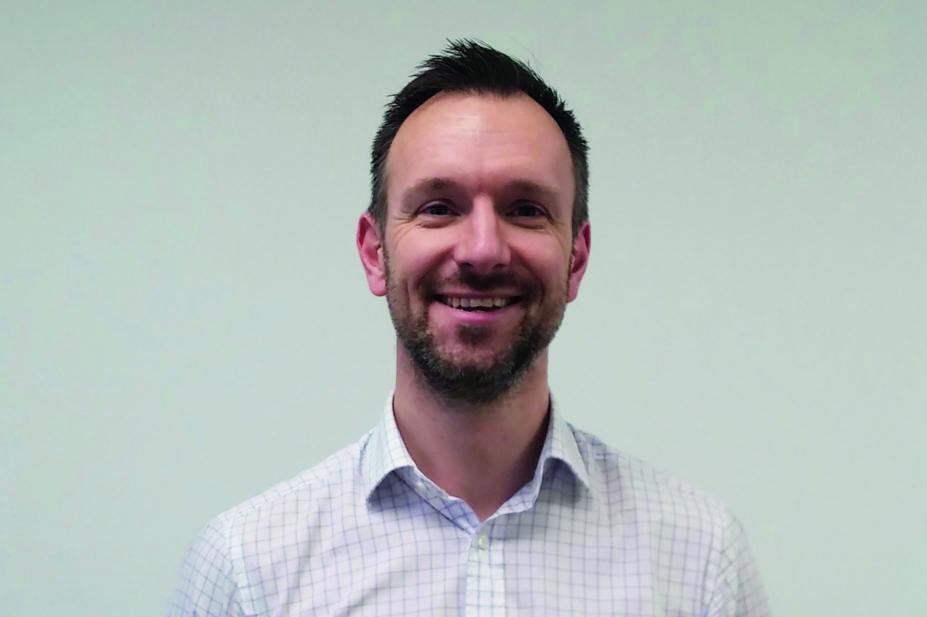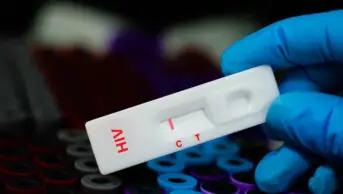
Courtesy of John Mowat
John Mowat works at the Carleton Clinic in Cumbria, which specialises in treating people with mental health needs, learning disabilities and problems with substance misuse.
How did you decide that you wanted to be a pharmacist?
I remember watching my grandfather, who suffered with angina and underwent cardiac bypass surgery, managing his medication while I was very young, and this sparked my initial interest in health and drugs. At the time, I was confused about how he could be so unwell and how the tiny tablets he was taking could possibly make it all better. He would fill his own homemade dosette box for the coming week each Sunday night and I used to ask what each one was and what they were for. Mostly the reply was simply “for my heart” but it was enough for my interest to grow.
It was only when at high school and the time came to find work placements that I realised I probably wasn’t good enough to be a professional footballer and the thought of pharmacy as a career entered my head.
What is your current role and how did you get there?
My current role is as multi-site pharmacy manager for LloydsPharmacy. I primarily work as the lead pharmacist based in the Carleton Clinic, a mental health hospital in Carlisle, where we have been commissioned to provide the medication supply service for the Cumbria Partnership Foundation Trust. This includes the prescription supply to the onsite mental health wards and community hospitals as well as, via a wholesale unit, the stock supply to 89 wards and clinical services in the north of Cumbria. This also involves a community pharmacy located a couple of hours away, which services one site in the south of the contract area.
I also work as the line manager to three outpatient dispensary pharmacists working in services commissioned by the University Hospitals Morecambe Bay NHS Trust in the south of Cumbria. After completing a secondment as multi-site pharmacy manager in Newcastle, where Lloyds have two busy outpatient dispensary pharmacies, I was offered my present role. Previously, I worked in a health centre branch of Lloyds in Dumfries, which also serviced the local prison under the Scottish Prison Service contract. The service contract for Cumbria was due to begin as my contract in Newcastle ended, so the timing of the offer to set up the service couldn’t have been better.
What makes working in a mental health clinic different from other roles?
Typically, my day involves processing the ward orders, both named prescriptions and ward stock with discharge medication, often requiring dispensing into dosette boxes or the production of medication-administration record charts. I frequently encounter clinical and technical errors or omissions with the information received, which obviously lead to discussions with the ward nurses or doctors to remedy.
A lot of time is spent maintaining the ongoing supply of critical medications and the associated monitoring of blood results and documentation
We also deal with the outpatient supply of clozapine and depot antipsychotic injections to patients who are under the care of the community mental health teams, so a lot of time is spent maintaining the ongoing supply of these critical medications and the associated monitoring of blood results and documentation. We have formed a close working relationship with pharmacy technicians, in particular, and pharmacists from the trust, so we regularly discuss an individual patient’s medication and requirements. As the area we deliver to is rural, we need to be prepared on time for our delivery drivers to be able to supply within agreed schedules, so thinking about the logistics and timetabling of work is essential and depends on the workload. As well as being the pharmacist, I also have to manage the two different contracts, which involves a lot of emails and phone calls relating to service delivery across the five branches.
What do you enjoy most about your work and of which achievement are you most proud?
The thing that I enjoy about working in the Carleton Clinic, is being more involved in the patient’s care than you would be in a community pharmacy. Although I rarely see any of the patients from the mental health wards, I do see their prescription charts regularly and can follow their progress during their admission. I get to hear more of the patient’s background and the reasons for their admission, or details of their history, which helps to build a fuller picture. I have more flexibility to manage a prescription request, such as generic substitutions or formulation changes, without the need for prescribing changes. It’s possible to be able to select the most appropriate option without necessarily having to gain prescriber approval and, conversely, it can often be easier to have an amendment made without the patient being inconvenienced.
As far as achievements are concerned, our best was how quickly our processes were developed and our workflow managed. While neither the mental health aspect nor stock supply are unique, having to do both, with the community hospital and clinic service provided a greater challenge. In addition, the geography of the trust’s site provides its own challenge and to have been able to develop a system quickly in order for our service to be immediately seen as an improvement on the previous pharmacy supplier gives me great satisfaction. Our good relationship with the trust has developed in the year since we took over the service, and this has also made it easy to discuss any aspect of the contract in an atmosphere of mutual respect.
I’m passionate that the pharmacy profession be highly regarded by patients and the general public
What part of your current role do you find most challenging?
The most challenging aspect is trying to manage the demands of 89 different wards, clinics or services. Due to the distances our drivers need to cover in the course of their day, we have to be prepared for them to be able to leave at a scheduled time. This presents a problem when drug orders arrive after the cut-off time — but with an urgency to have it dispensed. This can put pressure on us to reprioritise our work but still achieve the demands of the contract. In addition, because we are based within the specialist mental health hospital, a lot of queries from prescribers are more in-depth than I had previously experienced. While we have the support of the specialist clinical pharmacists, they are not always available, so I often have to search for the answers in reference materials. This develops my professional knowledge, but it also takes time, and that also increases pressure on the supply function.
Unfortunately, I don’t think all of our service sites fully appreciate how extensive our contract is and with their interests being their priority it can sometimes lead to difficult conversations when orders have arrived too late for delivery that day. Trying to balance the demands of the NHS trusts with those of Lloyds can be difficult and there is the occasional conflict of interest. Also, while our pharmacy is regulated by the General Pharmaceutical Council, the wholesale unit is licensed by the Medicines and Healthcare Regulatory Authority. This means two different sets of statutory regulations and potential inspections, two sets of standard operating procedures and all the associated documentation.
What do you hope to achieve in the future?
I would like to complete distance-learning courses for mental health to improve my knowledge in the speciality and become further integrated in the clinical pharmacy team. I have been invited to the Medicines Management Committee meetings and that’s something I hope to be able to attend and contribute to. I have two dispensers who are interested in starting the technicians course, and I am keen to support their enrolment and development. I’m passionate that the pharmacy profession be highly regarded by patients and the general public and would like to make a contribution to supporting this where I can.
What’s the most interesting thing that has happened to you while you were working in your current role?
Sitting in on a ward round on a mental health ward was eye-opening — to experience firsthand just how unwell and removed from ‘normal’ some of the patients are and the subsequent challenges they face in returning to a stable life in the community. Until that point my only experience of schizophrenia was from reading reference books, how it is represented in the media or by coming into contact with patients in community pharmacy, who generally have their condition well managed and under control. Having very limited ward experience and no mental health experience up to that point, it was a good lesson in the difficulties the ward staff face and was vital in my understanding how unstructured it can be on the ward. It also gave me a stronger understanding of just how crucial pharmacological intervention is for people with a mental illness.
A previous area manager had said to me that you should only stay in a job for five years before looking for something new to protect yourself against stagnating
What advice would you give a preregistration pharmacist hoping to pursue a career in this area and what should they consider before they do so?
Preregistration pharmacists should aim to gain as much variety in their early experiences as possible. I think it’s too easy to become insular and stunt your own development by settling for what’s comfortable too quickly. A previous area manager had said to me that you should only stay in a job for five years before looking for something new, to protect yourself against stagnating. I had worked in the same branch for seven years before relocating, but I am now into my third different position in as many years.
My learning and development have been more extensive in the past three years than in the previous seven, so I would advise preregistration pharmacists not to look to settle down too quickly if they want to continue their education while practising. Settling down can be good in helping to master a role, but it can also narrow the scope of learning and make it daunting to try something new. If they do have a strong desire to move into the healthcare services sector then it makes sense to make that interest known because there are opportunities to spend time during the preregistration year in those areas, in the same way that they may visit a community branch which deals with more nursing homes or even a higher volume of methadone than their base branch.

